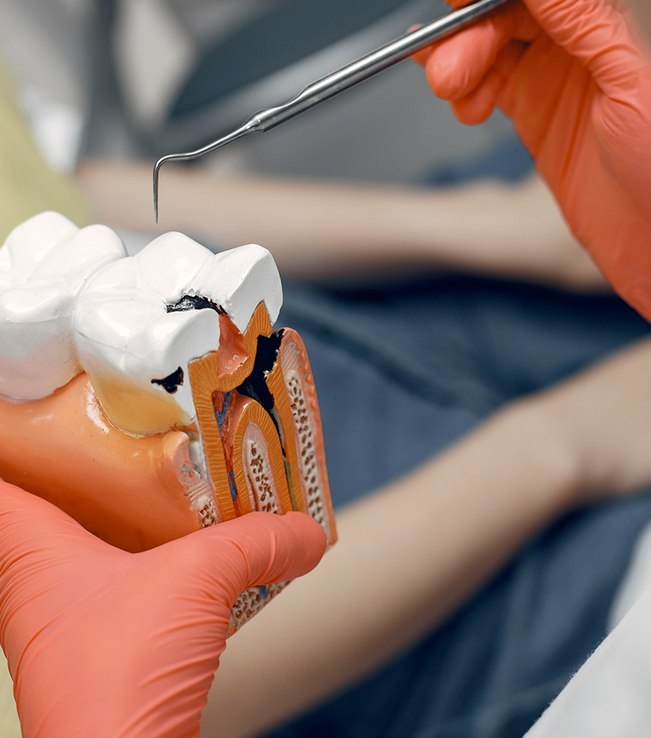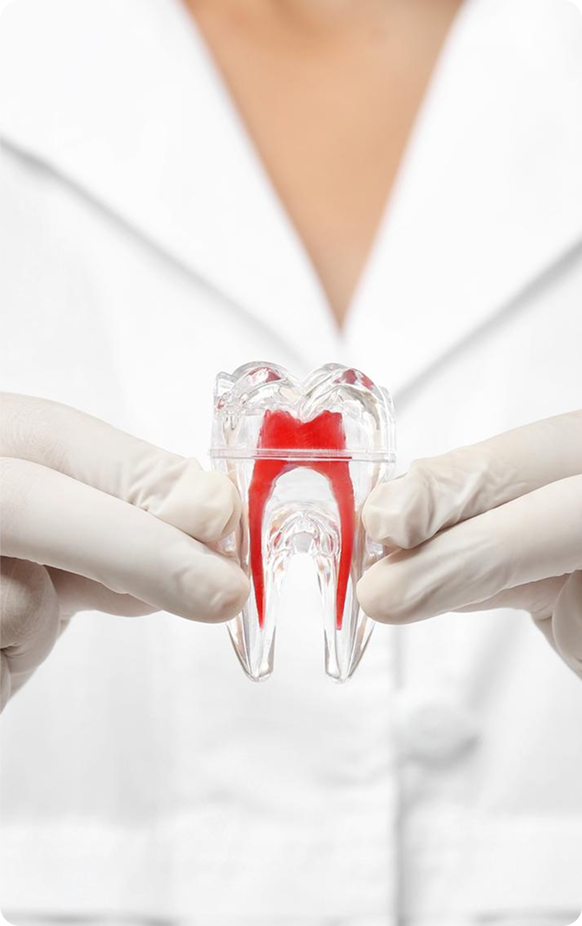Root Canal Treatment
Root Canal Treatments
We provide clinical root canal treatments and endodontic therapy with the goal is saving our patients’ teeth after severe damaged and decay. We service patients who have severely infected or injured teeth, but want to still keep their original ones when possible. It’s always beneficial to keep your teeth when possible, instead of removing them which can cause an array of other jaw and alignment issues.

What Happens During a Root Canal?
A root canal procedure is also know as Endodontic therapy and is the process whereby the infection within the pulp of a tooth is removed, the empty canal is cleaned. Through this procedure the tooth is restored to its original use by replacing the nerve with a rubber compound (gutta percha), topped with a composite filling, and depending on the level of decay, its capped with a dental crown.
In the past, if you had a tooth with an infected nerve, your dentist would have probably removed that tooth. Today however, with a special dental procedure, your tooth can actually be saved.
Root canals are a relatively simple procedure involving one to three office visits and best of all, saving your tooth through a root canal can preserve the function of your jaw and the maintain the alignment of your teeth.
During your treatment, your general dentist (endodontist) removes the affected nerve tissue. Next, the interior of the tooth is cleaned and sealed.
Finally, the tooth is filled with a special dental composite and if your tooth had extensive decay, your doctor may suggest placing a crown over top of it to strengthen and protect the tooth from breakage.
When Should a Root
Canal Be Done?
Many of our patients ask us: what is a root canal and when would I need one?

What Happens After the
Treatment?
After your root canal, as long as you continue to properly care for your teeth and gums through regular brushing, flossing, and checkups, your restored tooth will last a lifetime.
The Function of the Tooth
Nerve
A tooth’s nerve is not vitally important to a tooth’s health and function after the tooth has emerged through the gums. After that, it’s primary function is sensory – to provide the sensation of hot or cold. The presence or absence of a nerve will not affect the day-to-day functioning of the tooth.
When is a Root Canal
Treatment Necessary?
When a tooth is cracked or has a deep cavity, bacteria can enter the pulp tissue, and germs can cause infections inside the tooth. If the infection is left untreated, an abscess is likely to eventually form.
If the infected tissue is not removed in due time, pain and severe swelling can result. This resulting infection can injure your jawbone, become a factor in gum disease, and become extremely detrimental to your overall health. In the end, without a timely treatment, your tooth may have to be removed and other oral issues can develop.



What Are the Signs That
a Root Canal is Needed?
Teeth that require root canal therapy are not always painful. However, signs you may need a root canal include:
- Severe toothaches
- Pain when chewing
- Pain during the application of pressure
- Excessive sensitivity to hot and cold temperatures
- Dark discolouration of the tooth
- Swelling and tenderness on nearby gums
Get In Touch With Us
If you are experiencing any symptoms that may require a root canal, we advise that you make an appointment for a checkup as soon as possible. You may not need a root canal treatment, but if you do it’s better we deal with it quickly instead of letting the infection get out of control.
For patients seeking root canal treatments, appointments with our endodontist Dr. Lucas Da Silva, are scheduled for one Thursday or Saturday per month. To see our endodontist, make an appointment here. Someone from our team will be happy to help you and get you started.
Let Parkway Dentistry Improve The
Appearance of Your Teeth With Our Advanced
& Affordable Dental Care!
Associations & Credentials
Associations & Credentials




CONTACT US
Schedule an Appointment
or Ask a Question
Fill out the torm below to schedule your appointment with our dental office. Once your intormatlon is sent, our scheduling coordinator
will contact you promptly to confirm your appointment.
To make an appointment by phone call 519-720-9119 or click here to schedule a Virtual Consultation.
To cancel or reschedule your appointment, contact our office directly at 519-720-9119 and we’ll be happy to help you.
New read our EAQ for answers to dentistry questions, or visit our dental treatments page for explanations of each procedure.